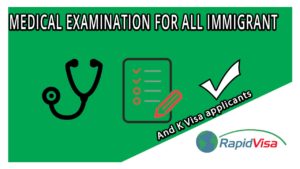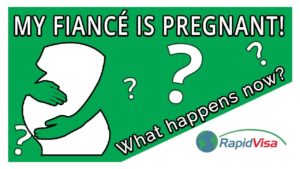Fiancé visa interview sample questions to help you prepare
The K-1 Interview
The K-1 interview is perhaps the biggest cause of anxiety for anyone applying for a fiancé visa. While it’s completely understandable that you find this stressful, rest assured that it probably won’t be as bad as you think. The consular officer will primarily be interested in determining whether or not you and your partner have an authentic relationship.
For the most part, the U.S. citizen sponsor is not permitted to attend. Some embassies, however, may have varying policies, so be sure to check the consulate website to determine whether both parties can be present. If you are bringing children on a K-2 visa, they will need to come with you to the appointment.
As for the actual questions: these will vary depending on the particular officer, but in general, they (the consular officer) will first want to get to know you — including your name, birthday, nationality, and any other pertinent information. Then, they will likely want to know more about your fiancé(e) — everything from their name to their hobbies and interests.
Finally, the consular officer will likely want to know more information about your relationship with the U.S. sponsor.
This guide will go over some of the most common questions asked during the K-1 interview.
Sample K-1 Questions
The questions below are examples of possible K-1 visa interview questions. You won't be asked all of these questions during your interview.
For starters, the consular officer will likely ask questions about you.
personal information
- What’s your nationality?
- What type of work do you do?
- Have you received a K-1 fiancé(e) visa in the past? If so, why?
- Have you been arrested?
- Have you been married before?
- Are you aware of the steps following the approval of your visa?
- Have you been to the United States before?
Questions about your past — about previous trips to the U.S. and past marriages — are intended to find any evidence of former U.S. immigration issues. They want to know if you have any immigration violations on your record or if you’ve attempted to use a K-1 visa application for fraudulent reasons before.
In general, as long as you haven’t attempted fraud or anything of the sort, you have nothing to worry about. If you think that your history might present some red flags, you can prepare an explanation, detailing the circumstances surrounding the situation in question. Having documentation and evidence to back up your explanation is always a good idea.
questions about your fiancé
- How old are they?
- Where do they live?
- What are the names of your fiancé(e)’s ex-spouses?
- Does your fiancé live with anyone?
- Have they been married before?
- What’s your favorite thing about them?
- What hobbies or skills do they have?
With these questions, they’ll want to find out whether (and how well) you know your fiancé(e).
They’ll also want to make sure that your fiancé isn’t still married and that you’ll actually be able to get married within the 90-day window following your arrival in the United States.
relationship history
- How did you both meet?
- What do you like to do together?
- Do you know your fiancé(e)’s parents?
- Have you ever been to the U.S. to visit your fiancé(e)?
- What was the proposal like?
- Have you planned the wedding? If so, do you have any proof?
- Who will be at the wedding?
Here, the consular officer will want to confirm that you and your partner have an authentic loving relationship.
Specifically, they’ll want to find out whether you really intend to get married.
If you and your partner are in an authentic, verifiable relationship, you have nothing to worry about. If you think any of your answers might lead the interviewer to doubt the veracity of your application, then you’ll just need to prepare an explanation and gather any supporting proof.
Finally, make sure you find some time to relax and breathe prior to your interview. While at the interview, you should:
- Be confident in the strength of your relationship
- Be respectful and polite
- Be relaxed
If, for some reason, you can’t attend your interview, be sure to contact the embassy as soon as possible to reschedule.


